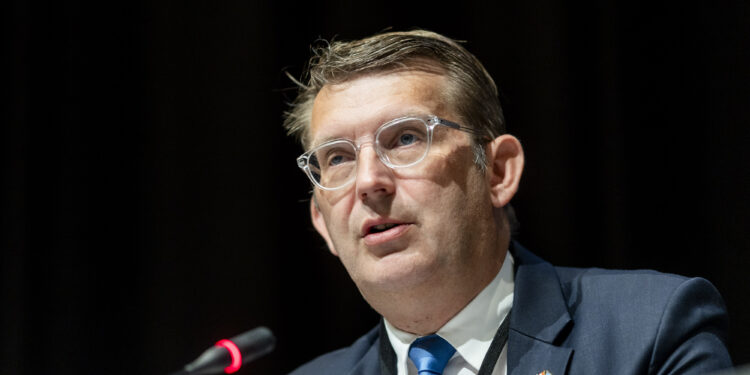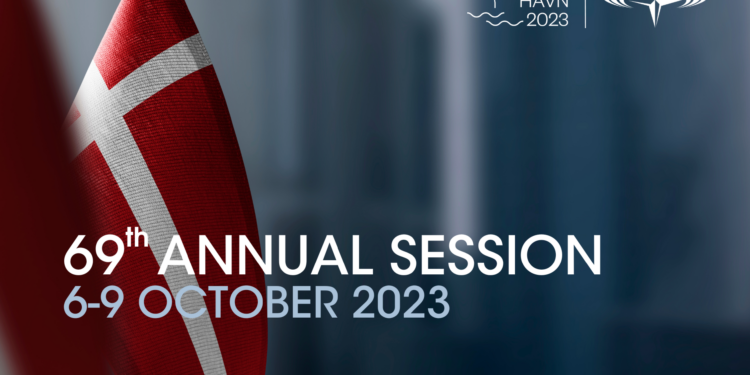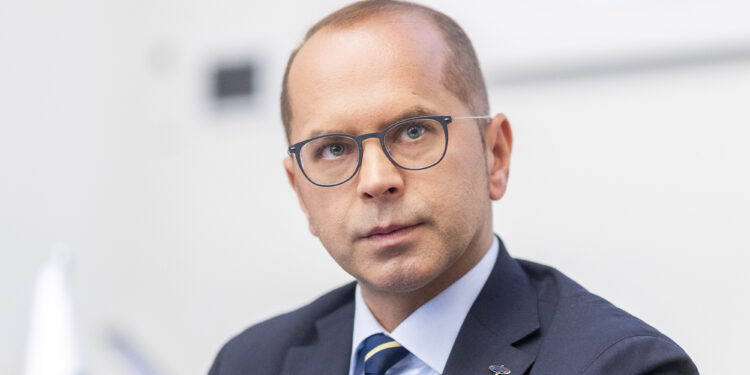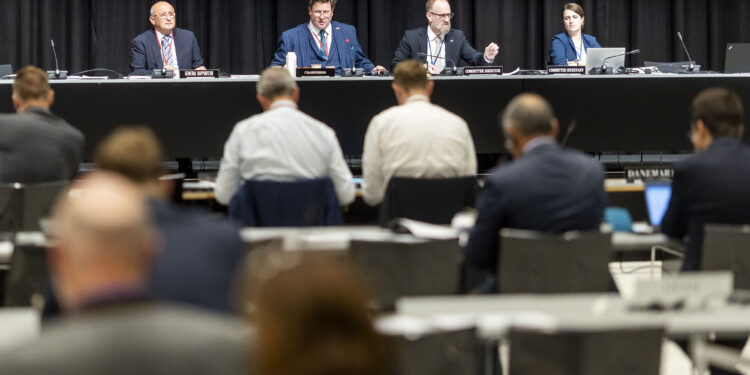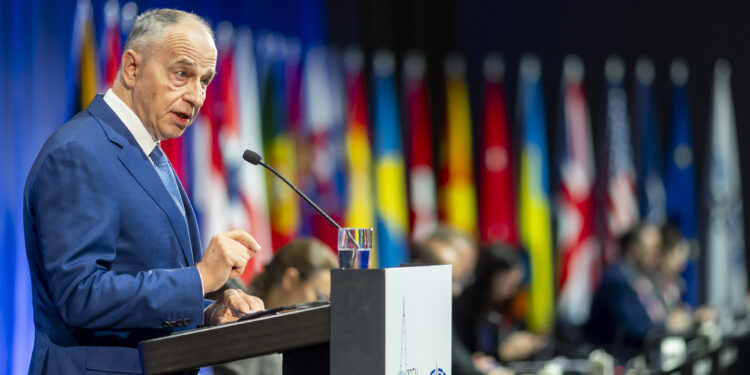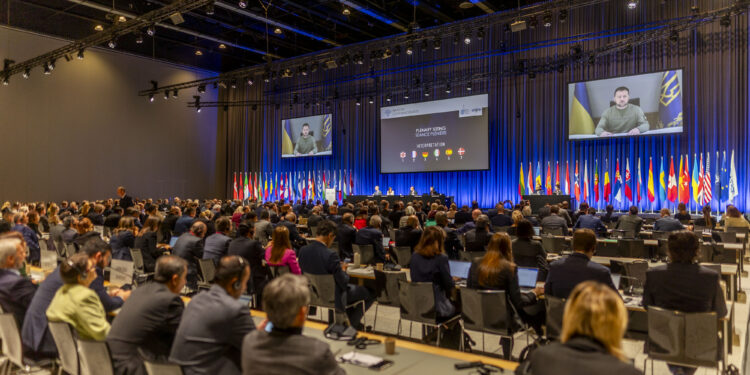69th Annual Session of the NATO Parliamentary Assembly, Copenhagen
From 6 to 9 October 2023, the NATO Parliamentary Assembly (NATO PA) gathered for its 69th Annual Session in Copenhagen. EUROMIL’s President, Emmanuel Jacob, participated at the Assembly.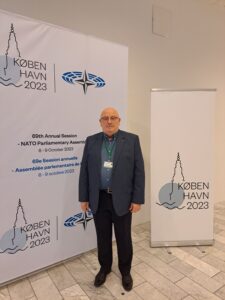
All 274 parliament members representing 31 NATO member states, along with approximately 100 members from around 25 partner countries and parliamentary bodies addressed the key topics on the Euro-Atlantic defence and security agenda and assessed the outcome and key decisions taken at July’s NATO Summit in Vilnius. During the Annual Session, members discussed and adopted draft reports in the Assembly’s five Committees and several resolutions distilling key policy recommendations.
NATO Allies must stand firm in their support for Ukraine at a “decisive moment” where Russia “has upended the global security order,” Michal Szczerba, Acting President of the NATO Parliamentary Assembly said on Friday the 6th of October.
“Here in Copenhagen, we will again make crystal clear our own unwavering support for Ukraine – for as long as it takes for Ukraine to prevail and to win,” Mr Szczerba told a news conference as the Assembly opened its 2023 Annual Session. “We want to ask our parliaments and governments to sustain military support for Ukraine.”
“We are an Alliance of democracies,” Mads Fuglede, head of the Danish Delegation to the NATO PA told the news conference. “As Allies we speak with one voice. We have one goal which is that Ukraine should be free, and that Russia should be held accountable for this war.”
Committee Meeting (DSC)
During the full weekend, five Committee Meetings were organized: the Committee on Democracy and Security, the Defence and Security Committee, the Economics and Security Committee, the Science and Technology Committee and the Political Committee. As observer, EUROMIL’s President monitored during the weekend the work of the Defence and Security Committee (DSC).
Saturday, 7 October 2023
The DSC, chaired by Alec Shelbrooke (UK), opened with a speech on “Denmark’s Contribution to NATO’s Revised Deterrence and Defence Posture” by Troels Lund Poulsen, Minister of Defence of Denmark. He underlined that NATO and EU must continue their support for Ukraine and emphasized that Russia underjudged the strong transatlantic bond. “The decisions that are taken are expensive, but necessary” the minister continued. “What we do now, will for always be remembered” he said. Furthermore, he underlined that it is not a question of doing more NATO or more EU, but that we need to do both and that both should work closer together and complement each other.
On rebuilding Ukraine, Minister Troels Lund Poulsen said that this should be something especially the EU should deal with, however, if possible, in collaboration with the US.
Gustav Gressel, Senior Policy Fellow, European Council on Foreign Relations (ECFR) and Douglas Barrie, Senior Fellow for Military Aerospace, International Institute for Strategic Studies (IISS), talked about “Russia’s War of Aggression Against Ukraine” and the “Evolving Missile Threat to Allied Security”. Gressel emphasised that Putin’s theory of victory is based on a long war during which the Western’s support for Ukraine would erode and its economy would be more dependent on the Western countries. Looking at the future, the fundamental question will be how and which weapon systems will be delivered to Ukraine, as the current stocks are running out. However, Ukraine requires increased defence-industrial output in the West and training will have to be increased, especially at the staff level.
Reports of the Committee and Sub-Committees[1][2]
Special rapporteur, Rick Larsen (US) presented his draft special report “Ukraine’s Fight for Freedom & Allied and Global Response to Russia’s War”. This updated draft special report outlines the variables leading to Russia’s full invasion on 24 February 2022. It reviews the evolution of the war’s distinct phases, as well as the parallel evolution of the coordinated Allied and partner assistance supporting Ukraine’s legitimate self-defence against Russian aggression. It concludes with a series of recommendations for Allies and partners to consider, among them. During the debate, a Ukrainian delegate raised the issue of NATO membership, which the special rapporteur was not competent to answer. However, he added that at some point, the NATO PA should decide on its proposition towards the Atlantic Council meeting on this issue.
On his turn, general rapporteur Utku Cakirozer (Turkey), presented the draft general report “Ensuring an Allied Defence Industrial Base for NATO’s New Deterrence and Defence Baseline”. In the wake of Russia’s illegal and unprovoked invasion, NATO Allies have surged aid to Ukraine – pouring in all forms of vital assistance, including military, economic, humanitarian, political and diplomatic, believing that Ukraine’s self-defence is legitimate and its sovereign rights worth defending. Yet, the military aid offered by NATO Allies has revealed a growing strategic challenge: the defence industrial bases of NATO countries cannot currently replace military equipment at the rate at which it is being consumed in Ukraine and, therefore, cannot resupply their own strategic NATO stockpiles. This situation threatens NATO’s defence and deterrence posture as it lowers military readiness and calls into question NATO’s ability to deter future aggression. NATO Allies, therefore, must create new, dynamic, and resilient defence bases capable of producing military systems at the scales required by a more threatening strategic environment.
Alec Shelbrooke (UK) presented, in the name of rapporteur Mark Lancaster (UK), the draft report of the Sub-Committee on Future Security and Defence Capabilities “Troubled Waters: How Russia’s War in Ukraine Changes Black Sea Security”. The Black Sea region (BSR) is a strategic fault line between the NATO Alliance and Russia. Except for Türkiye, the region came into the post-Cold War era profoundly unsettled about the strategic direction of its littoral states. The region’s east-west split resulted in a series of conflicts, culminating in Russia’s full-scale invasion of Ukraine on 24 February 2022. Russia’s war in Ukraine quickly developed into the most violent and consequential conflict since the Second World War. Russia’s 2022 full-scale invasion, however, marked the second time in eight years that Russia had unlawfully used military force to seize Ukrainian sovereign territory. Russia’s 2014 illegal annexation of the Crimean Peninsula permitted Russia’s Black Sea fleet a virtual stranglehold across the entire Black Sea.
Finally, rapporteur Jeroen Van Wijngaarden (NL), presented the draft report of the Sub-Committee on Transatlantic Defence and Security Cooperation “Sea Change: The Rapid Evolution of Baltic Sea Security After Russia’s Invasion of Ukraine”. Russia’s invasion of Ukraine unleashed the most violent and consequential conventional war on the European continent since World War II. The war sent immediate shockwaves that continued to resonate along the Alliance’s eastern flank, from the High North down to the Black and Mediterranean Seas. The impact on Baltic Sea security is ongoing and represents a potentially wholesale transformation of the region’s security order.
Sunday, 8 October 2023
Kristian Søby Kristensen, Head of Centre and Senior Researcher, Department of Political Science, University of Copenhagen, talked on the “Arctic Security and the Role of Denmark”. For the speaker, the war in Ukraine has fundamentally changed Artic geopolitics, both inside the region and as in relation to European geopolitics. Today, there is more strategic competition and more military balancing in the region. For Denmark, and in a broader perspective the region with the Faroe Islands and Greenland included, the Arctic is the highest priority. Kristensen made clear that the Arctic region shouldn’t be seen as one unique region but be split up into several strategic regions.
Marina Vulović, Associate Researcher, German Institute for International and Security Affairs (SWP), presented the “Political and Security Challenges in the Belgrade-Pristina Dialogue”. The main challenge is the Belgrade-Pristina Dialogue which has been stalling for years. Furthermore, it is a frustration that the 2023 February and March Ohrid agreements are not implemented. It can also not be denied that the recent Banjska attack has several implications such as the strengthening of KFOR with 700 troops. Even if there is no evidence of Russia’s involvement in the recent crisis, it is clear that Russia benefits from the regional instability. However both Belgrade and Pristina will have to take steps to clear the situation. Finally, Marina Vulović emphasized that a clear roadmap is needed and that it should be followed and implemented by all parties.
The general rapporteur Utku Cakirozer (Türkiye) presented a draft resolution “Implementing NATO’s New Deterrence and Defence Baseline”. The resolution concludes with several demands to the member governments and parliaments of the North Atlantic Alliance. One of these demands is to continue to solidify and evolve the EU-NATO strategic security partnership, welcoming the commitment in the 2023 EU-NATO Joint Declaration to take this unique and essential partnership to the next level, and ensuring effective cooperation playing to each organisation’s strengths, avoiding unnecessary duplication, and ensuring the fullest involvement of non-EU Allies.
Alec Shelbrooke (UK) presented, in the name of the rapporteur Lord Mark Lancaster (UK), a draft resolution on “Strengthening Stability and Security in the Black Sea Region Following Russia’s Full-Scale Invasion of Ukraine”. Among others, the resolution warned that, since Russia’s full-scale invasion of Ukraine, Moscow has further increased its full spectrum of military and hybrid tactics, to include a systematic disinformation campaign to destabilise the government of the Republic of Moldova and to support pro-Russian candidates and pro-Russian parties, to increase its influence over the Black Sea Region. Closing the resolution the Committee asked to continue to increase and speed up Allied, NATO, EU, and partners’ political, military, intelligence, financial, training and humanitarian support to Ukraine, and sustain this support for as long as it takes for Ukraine to prevail and rebuild and to continue to support Ukraine’s NATO membership goal by assisting, to the extent possible, with its reform agenda.
Plenary sitting
The Plenary Sitting was held on Monday 9 October 2023 and was opened by Michal Szcerba the acting President of the NATO PA. “We must again and again reaffirm our support for Ukraine”, he emphasised. “We must keep up the pressure on Russia and hold the Russian regime and all its supporters accountable.” With the statement that it is the NATO PA’s task to help the Verkhovna Rada to be part of this Assembly and Ukraine to NATO, he received applause and support from the delegations.
Later during the Plenary sitting, Michal Szcerba (Poland) was elected as the President of the NATO Parliamentary Assembly.
Søren Gade, Speaker of the Folketing, and Mette Frederiksen, Prime Minister of Denmark, welcomed at their part the delegates. Both addressed the recent situation in Israel. The Prime Minister emphasised the efforts from Denmark supporting Ukraine, especially delivering fighter planes. However she also asked all present delegates to make sure that war fatigue will not take place in the Alliance. Interesting was that Frederiksen underlined that besides investment in equipment and weapons, we also need sufficient competent personnel. For what concerns the Western-Balkan and the African Union, the Prime Minister said that the European Union has a crucial role to play.
Volodymyr Zelenskyy, President of Ukraine addressed the Assembly via videolink. The President said that the same happened in Israel and Ukraine. The only difference is that the past days in Israel it came from a terrorist organization, while Ukraine is attacked by a terrorist country. How far can evil go, he wondered! It is not the moment to stay silent as global security is at risk, he continued. At his turn, Ruslan Stefanchuk, Chairman of the Verkhovna Rada, also addressed the Assembly via videolink and thanked them for their support.
Ambassador Mircea Geoană, Deputy Secretary General of NATO, address the Assembly and updated on the last Summit meetings and the current geopolitical situation. His speech was followed by a question and answer period during which several issues such as the 2 %, Kosovo, Ukraine and the EU-NATO collaboration were addressed. On the latter, Deputy SG Geoană emphasised that the EU is a key partner for NATO. On the third agreement he underlined the importance of the security and climate work and the need of synergies between both key players in this field. For what concerns the eternal 2% discussion, he made clear that the world drastically changed between the Wales and the Vilnius engagements. Also important to mention is that in the framework of the NATO Defence Planning Process (NDPP) personnel is a part of the activities under “force planning”.
General Philippe Lavigne, NATO Supreme Allied Commander Transformation, explained the work and functioning of SACT. In his presentation he focussed on the new challenges our armed forces are dealing with. However, he also underlined the importance to invest in talent and making sure to have competent personnel for these new tasks. He also referred to highly trained reserve forces, using Finland as an example because they already trained based on NATO standards even before they joined recently.
Almost closing the plenary sitting, several resolutions were approved by the Plenary:
- Enhancing the Protection of Allied Critical Maritime Infrastructure.
- Protecting Allied Democracies and Partners from Disinformation.
- Implementing NATO’s New Deterrence and Defence Baseline.
- Strengthening Stability and Security in the Black Sea Region Following Russia’s Full-Scale Invasion of Ukraine.
- Towards the Reconstruction of Ukraine.
- Delivering on the Vilnius Summit Decisions: Accelerating NATO Adaptation, Supporting Ukraine.
Finally, the 2023 “Women for Peace and Security” price went to Sviatlana Tsikhanouskaya, Leader of democratic Belarus and head of the country’s United Transition Cabinet. She is the second women of a non-NATO country to receive this price. Sviatlana said that this price is for all women fighting for freedom and democracy or being the wife of political prisoners like she is with her husband since several years in jail. Security without democracy is not possible she emphasised and this is also the case for Belarus, Sviatlana’s country. The road to freedom we must walk together, Sviatlana ended her speech.
The next Spring Session of the Parliamentary Assembly will be held in Sofia (Bulgaria) in May 2024.
[1] The brief contents of the reports are partly copied from the NATO PA website.
*The pictures are provided by NATO PA


